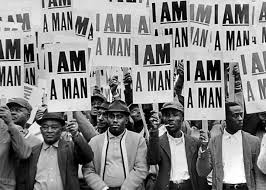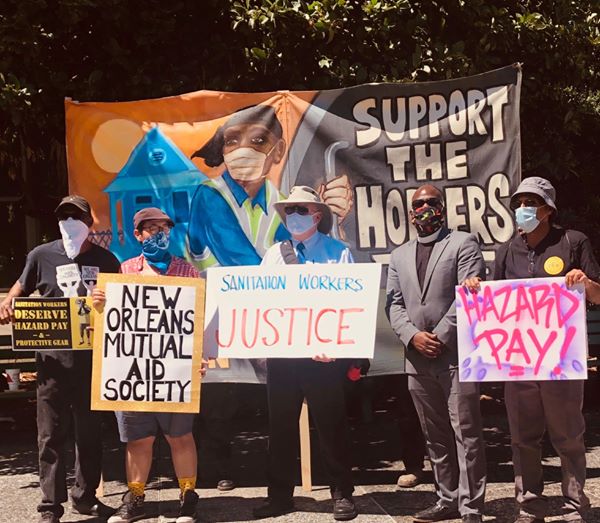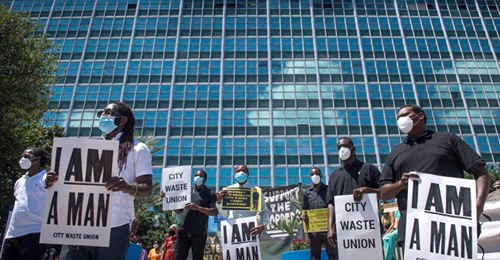By C.C. Campbell-Rock
On his second trip to Memphis to support striking sanitation workers, Rev. Dr. Martin Luther King Jr. lost his life on the frontlines in the fight for fair wages, better work conditions, and the respect and dignity demanded by the workers on the signs they carried: “I Am a Man.”
Fifty-two years later, sanitation workers in New Orleans are carrying the same signs, demanding the same benefits, with several caveats. In addition to a living wage and better working conditions, striking sanitation workers employed by PeopleReady, a subcontractor with the Metro Service Group, are also calling for $15 per hour, inclusive of hazard pay and the personal protective equipment (PPE) necessary to avoid contracting the coronavirus.

Entering the second week of their strike, at least 16 hoppers are on the picket line. “We gotten no hazard pay, no health insurance. We’re sure that’s not right,” Shone Gray, a 15-year sanitation worker, told members of Justice and Beyond during a Zoom Conference. “I guess Metro is helping the drivers, not the hoppers. We don’t have any type of benefits or insurance, none of that.”
Ironically, the sanitation workers’ dispute is pitting a black owned company against some of their black workers.
Metro Services Group (MSG) is a black-owned corporation co-founded by brothers Jimmie M. Woods and Glenn H. Woods. Headquartered in New Orleans, the company directly employs 250 people and 76 contract laborers. The firm provides sanitation, construction/demolition, disaster recovery and industrial and environmental services to municipalities in Georgia, South Carolina, Mississippi, Texas, Tennessee, Florida, and Philadelphia. MSG also have contracts with federal agencies. The firm generates $19.9 million in sales annually, according to Dun & Bradstreet.
A press release MSG’s website disputes what it calls “scurrilous and baseless claims” by contracted hoppers who allege that Metro hasn’t provided the personal protective equipment needed for the hoppers’ safety.
“When COVID-19 unfolded, prior to the protest, Metro bought 15,000 KN95 masks, surgical masks, bandanas, 2000 pairs of various gloves and hand sanitizer.” Metro also routinely sanitizes its vehicles, facilities and equipment and the company denies allegations that their vehicles are prone to breakdowns. Its current fleet is comprised of 2017 vehicles, which undergo regularly scheduled maintenance.

“I only got a mask one time. A week or two after corona, they only us a pair of gloves, once a week. If you don’t show up between 34:00 am and 3:30 am, you don’t get the PPE,” Gray adds. Sanitation trucks roll out at 3:45 am, says Gray.
However, Metro’s publicist Virginia Miller says the PPE shortage allegation is false.
“The hoppers are direct employees of PeopleReady. PeopleReady also provides their own PPE to employees they assign to work for Metro,” and “Metro has been assured by all its contractors that no one working on behalf of Metro is being paid less than the current living wage of $11.19/hour,” the current Living Wage under the City’s Living Wage Ordinance.,” according to a Metro Fact Sheet.
“They’re paying us $10.25 an hour and we’re asking for $15 per hour. The temp service has come in here and pay us what they want to pay us,” Gray told Justice & Beyond members.
Pay dispute aside, $11.19 per hour is still below the federal poverty threshold for a family of four.
The hoppers want a benefit package that includes hazard pay, health insurance, a living wage, and sick leave. To that end, the striking workers have joined the City Waste Union.
“We have no workers comp, no health insurance, no benefits,” says Gray, who says he works at least 12 hours a day. The hopper says workers can easily get hurt on what he calls a dangerous job. “I broke my leg on the job, but I have to pay for it out my pocket. I had to go to the hospital on my own.” When asked if Metro is testing employees for the coronavirus, Gray says, “They said they would start test but they (tests) still haven’t come in yet.”
“He (Jimmy Woods) should see the world through the view of his workers; pay a living wage, hazard pay and benefits. These young men know what they’re fighting for. If you can afford to pay PeopleReady $16.75 an hour for each hopper, why not do your own in-house human resources?” Malcolm Suber, an organizer with the NOLA Workers Group, which is helping to garner support for the hoppers, asks.
“The Metro Service Group fully supports hazard pay for sanitation workers and others on the front line in this challenging Covid-19 environment. As our letter of May 1st to Congressman Richmond demonstrates, our position in this regard has been clear since before this demand was made by some of our contract “hoppers”. Without any doubt, our employees and contractors and others in the sanitation field deserve hazard pay.
“Metro has welcomed an opportunity for a dialog with the strikers presented by Councilman Jason Williams. While there are existing differences of opinion, these are very real and complex issues that deserve to be addressed in fact based, solution-driven dialog,” according to the company’s fact sheet.
In a May 12 press release, Metro denied any contact or conversations with the strikers prior to the labor stoppage on May 5. “Rather than address any concerns in a meaningful and productive way, they chose to make news with the ongoing and active support of a national group, the Democratic Socialists of America (DSA).”
The DSA is indeed supporting the striking hoppers. The organization has posted a Go Fund Me link for the sanitation workers and some DSA members are on the picket line with them.
However, Justice & Beyond, a multi-group coalition of civil rights and social justice advocates, and Loyola Law Professor Bill Quigley are also standing up for the hoppers. The executive director of the Gillis Long Poverty Law Center, Quigley has authored numerous legal analyses about fair wages, the need for minimum wage increases and workers’ rights. He also teaches social justice law at Loyola, among other subjects.
“That’s Senator Bernie Sanders people,” Quigley says of the DSA. “He has millions of followers, they’re here in New Orleans and nationwide.”
“The city, Metro, PeopleReady, every one of those contractors should do the right thing. It’s a question of fairness and justice. It’s a common tactic for business to avoid accountability,” Quigley explains regarding Metro’s insistence that PeopleReady is the employer of the striking hoppers. “The city hired Metro and Metro hired PeopleReady. You can’t avoid your responsibility by subcontracting it out.”
Reverend Gregory Manning, the co-coordinator of Justice and Beyond and Pastor of the Broadmoor Community Church, affirmed J&B’s support for the hoppers in a recent letter to Mayor LaToya Cantrell. He first expressed the group’s gratitude for Metro’s 38-year history as a highly reputable black-owned company in the city of New Orleans.
”Indeed, they have a set an example of success that many should strive for. I would like to personally thank Mr. Jimmy Woods for his employment of young African-American men and women throughout the city.”
“With that said, I would also like to make it clear that Justice and Beyond stands in solidarity with the striking workers of the City Waste Union. We believe that these workers should be supplied with proper PPE so that they may be protected from COVID-19 . This should be a standard distribution of new PPE daily for each worker. This PPE should be from head to toe. We also believe that each worker should be given hazard pay, sick leave, insurance and at least $19 an hour; the housing wage for New Orleans.”
Metro documents indicate that there are ongoing conversations to find a resolution to the workers’ demands. U.S. Representative Cedric Richmond is being asked to include sanitation workers in the House’s Hero Act and Mayor Cantrell and Councilperson-at-Large Jason Williams are being consulted. Metro Attorney David Davillier told a news reporter that one option could be an increase the city’s sanitation fees.
The hoppers are not alone in their fight for hazard pay and $15 per hour, and benefits. Essential workers nationwide, who continue to risk their lives to work during the coronavirus pandemic, are demanding the same benefits as unionized workers. Health experts say the coronavirus will continue to circulate for months.
Sanitation workers are essential to maintaining public health. Without them, the exposure to a plethora of illnesses caused by bacteria and other life-threatening organisms would make the coronavirus threat a walk in the park.
“Everybody needs to change. The world has changed,” Quigley adds, regarding the need for justice, fairness, better pay and a higher quality of life for everyone.
The best companies adapt and change too.


Excellent article C.C. …THIS SITUATION NEEDS TO BE ADDRESSED. These men work very hard.
Their pay & benefits are severely unfair…Not all persons of color have our best interest at heart.(Clarence Thomas)
The contractors can have a surplus of funds & still pay equitable wages to these men to properly support their families….Thanks for always be on the Frontline C.C.
” PEACE WITH POWER” SANDRA EWELL